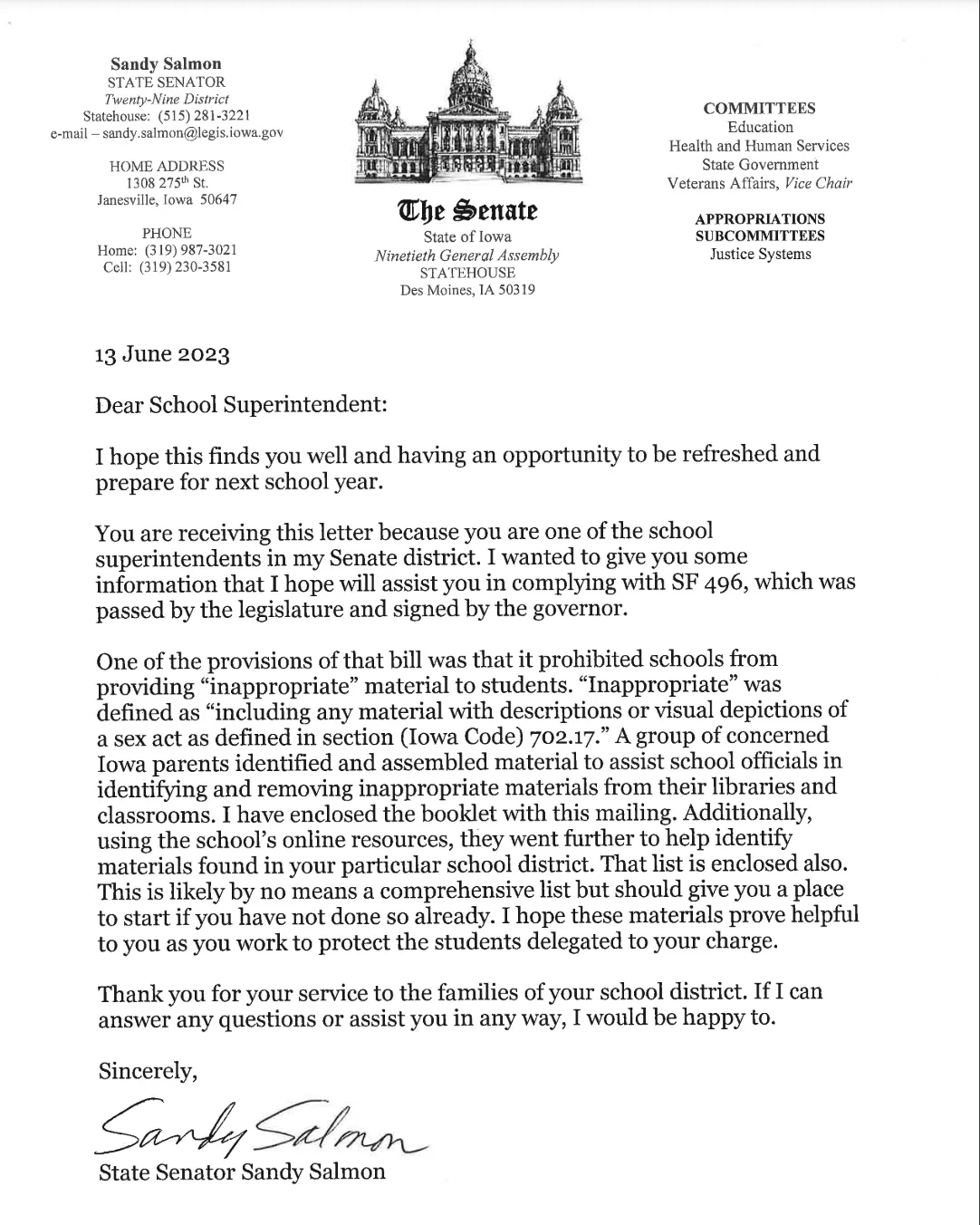
Iowa Senator Tells Schools Use Moms For Liberty’s BookLooks, Book of Books to Remove Books
Last spring, Iowa republican legislators passed Senate File 496 (SF 496). This sweeping piece of legislation includes provisions that disallow educators to use students’ preferred pronouns, among others related to gender and sexuality in public schools. But it is perhaps most known in the for its wide range of topics that would lead to books being pulled from schools across the state.
Senate File 496 requires all materials be age appropriate and that there be no “descriptions or depictions of sex acts,” defined by Iowa Code 702.17. The state has given virtually no guidance beyond what’s written, and some districts, unsure of how to approach implementation on the timeline provided by the state prior to the pause on the book ban portion of the bill, turned to artificial intelligence to do the culling.
The legislation was heavily championed by Hate Group Moms For Liberty, who became cozy with the state governor between 2022 and 2023. Moms For Liberty has been active in Iowa and has used Iowa schools as a launching point for misleading campaigns about the materials being offered to students in classrooms, as seen in the Polk County chapter’s omission of both pages of a letter sent home from a high school educator about book choices students would have in the classroom. The letter was used as proof of inappropriate books available in schools and led to that chapter’s creation of the Book of Books, used by chapters of Moms For Liberty nationwide.
SF 496’s passage led to two lawsuits. The first came from Iowa Safe Schools and a suite of parents and students from five districts in the state, claiming the bill infringed on their Constitutional rights. The second lawsuit came from Penguin Random House, alongside several authors, Iowa State Education Association, and a student, who claimed the book banning portion of the bill was overly broad and infringed on First and Fourteenth Amendment rights.
The United States District Court for the Southern District of Iowa issued an injunction on SF 496 in December related to the Penguin Random House lawsuit. This meant that the portion of the bill related to book bans could not be enforced until a decision in the case was made.
Despite the injunction, Iowa schools have been banning books in line with the vague and broad language in the bill since the start of 2024. The Des Moines Register, through open records requests, found that of the 3,400 books removed from school districts prior to the injunction, 2,000 were still not available to students. Among those unavailable to students include books that are common curriculum titles, including The Handmaid’s Tale, Slaughter-House Five, and I Know Why The Caged Bird Sings. Other books include popular targets by groups like Moms For Liberty, such as And Tango Makes Three, Identical, Tricks, New Kid, 19 Minutes, and more.
Perhaps it comes as little surprise that it has been the work of Moms For Liberty via their BookLooks website and Polk County’s Book of Books which have become a guidepost for several school districts in the state, thanks to one of the State Senators who championed the bill.
Annie’s Foundation, an anti-book censorship organization founded and operating in Iowa, used the Des Moines Register’s lead and submitted their own FOIAs of the paper’s FOIAs to see what additional information may be in those documents. As it turns out, the answer is a whole lot.
State Senator Sandy Salmon, who sat on the Senate Education Committee that proposed SF 496, has been working to “help” school districts in the state navigate the new law. But where there is no actual list or tool designated for schools to determine whether or not materials are in compliance with the law, Salmon has used state letterhead to inform some districts that there is–and it’s Moms For Liberty’s Book Looks and the Book of Books.
Dike-New Hartford High School received the following letter from Senator Salmon last June, following the passage of SF 496:

The letter came with a copy of the Book of Books, created and distributed by an Iowa Moms For Liberty chapter. At the top of the packet, which you can see in full here, are some of the books in the Dike-New Hartford High School deemed inappropriate. The letter refers to a group of “concerned Iowa parents” who created the packet, without ever mentioning the concerned parents were the Polk County Moms For Liberty chapter.
Recall that the state did not provide districts with a list of books. But here, a State Senator has taken it upon herself to tell a school which books would be good to begin the purge with, all based off a ratings system that is not only politically motivated but is based on cherrypicking passages out of context and counting up uses of profanity. Moreover, if decisions about books are about “local control,” per so many of the arguments, then why would a list created in Iowa’s 15th Senate district be applicable to the 29th Senate district?
How many districts Salmon sent such letters is unclear.
SF 496 remains in the court, though recent updates about the bill have anti-book ban advocates concerned that Iowa’s law might render its freedom to read as hindered as states like Florida or Texas. Unfortunately, unlike Florida or Texas, the media outside of Iowa has not paid as close attention–and more, has not highlighted the way Moms For Liberty has embedded itself into the state legislature.
As Annie’s Foundation explains:
Attorney General Bird invokes the government speech doctrine to justify the state’s unrestricted authority to remove any book it deems inappropriate from school libraries. The crux of her position is that since elected officials fund school libraries using taxpayer money, they (the legislators that you elected) have the exclusive authority to determine the school library’s book collection. According to this position, the selection of books for the library is government messaging, like selecting a statue for a park or a design for a license plate. The government holds the authority to include or remove whatever it desires and can utilize the school library as a platform to communicate its political messages.
[…]
In AG Bird’s Iowa, the government has the authority to strip books from school libraries that don’t advance its political aims. If her position prevails, school libraries could be systematically cleansed of materials that, in the government’s view, are insufficiently supportive of white nationalism.
A decision on the future of SF 496 remains to be seen. But whatever the ultimate outcome, the biggest losers remain the same people who have been losing at every turn of this rise in book censorship: students, educators, and the general public, all of whom have been duped by legislators more interested in serving a Hate Group than in actually helping improve and strengthen our educational and democratic institutions.
Iowa residents can contact State Senator Salmon at sandy.salmon@legis.iowa.gov or call at 515-281-3371. They can and should also contact the Senate Education Committee.
Learn more about Annie’s Foundation and take part in their efforts to end book bans in Iowa. The group is especially interested in tracking more information about book bans in Iowa schools and if you’re in Iowa, they’d love your help with the following:
- Learn what your local district did in response to SF 496. Where the Des Moines Register’s list of banned books is available to you, search the database. If you’re paywalled, Annie’s Foundation is happy to look it up for you. Send an email to contactus@anniesfoundation.com with your district information and we will look it up in the database and provide a list of books and the removal status for that district.
- If your school didn’t put books back, write to your school board and/or show up to a meeting demanding that they do so while the law is enjoined.
- If your school banned elementary books that definitely do not deal with sexuality in any way shape or form, ask administration what part of the law the book runs afoul of. For example, Eric Carle’s Draw Me a Star was pulled and not returned in the Mid-Prairie School District East Elementary School (and pulled but returned in Spencer Elementary). This book was banned in Florida because of a Moms for Liberty member saying that the abstract image of a nude man and woman were pornographic. They drew clothes on them and returned it to the library. In Iowa, the book was removed in these two districts apparently under the “Don’t Say Gay” portion of the law even though there doesn’t appear to be any LGBTQ content. These instances are where you press for exact details on why a book was banned.
- Educate yourself on what groups are active in your school district and are actively trying to influence school policy. Share that information with others within your community. Educate everyone you know about book bans. Being specific helps–inform your community about the actual books that have been removed in your district.
The above all play a role in how to fight book bans in 2024.











